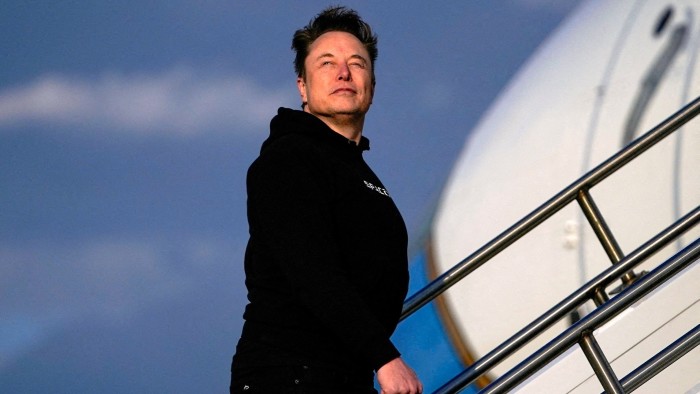Unlock the Editor’s Digest for free
Roula Khalaf, Editor of the FT, selects her favourite stories in this weekly newsletter.
The bond market put the brakes on Donald Trump’s mega-tariff plan earlier this month. Prices fell, people got “yippy”, and the US president blinked. But what delimits the comfort zone of his right-hand man and governmental cost-cutter Elon Musk? How far do Tesla shares fall before he puts both hands back on the wheel?
Investors got half an answer on Tuesday, with Tesla’s first-quarter earnings. Musk kicked off a call with analysts by saying he’ll be mostly back to his day job from next month, devoting only a couple of days a week to the so-called Department of Government Efficiency, pending the president’s wishes. The shares rose in after-hours trading, modestly.
There’s no denying Musk’s time-sapping role at Doge has weighed on Tesla’s stock. No US-listed company has lost more dollars of market capitalisation since its post-election peak, except the far-larger Apple and Nvidia. At $750bn, Tesla’s value is propped up not by car sales but by faith that Musk can work magic, and has the time to do so.
Trade tariffs and customer aversion to Musk’s divisive White House presence add to the toxic cocktail. Tesla’s vehicle revenue fell 20 per cent in the quarter, partly from disruptions from retooling factories, but also because demand slipped. Even the most loyal bulls are uneasy: Wedbush Securities recently cut its target price by more than 40 per cent, claiming Doge may have incinerated 20 per cent of Tesla’s future demand.

The question is whether Musk cares much about share price gyrations. He should, since his stake in Tesla is worth nearly $100bn. Then again, his roughly 40 per cent holding of rocket maker SpaceX is worth some $150bn, based on its latest employee share trade. Musk is still not promising to go full-time at Tesla; Doge is, he says, saving America from bankruptcy.
Being a visionary, it makes sense that Musk is more concerned with the future than the present. His view of that hasn’t changed: it’s one where Tesla makes humanoid robots called Optimus by the million, and family cars moonlight as robotaxis on their off-hours. He said on Tuesday — not for the first time — that Tesla could be worth more than the five biggest US companies combined, currently about $11tn.

Dare shareholders hope for their leading man’s undivided attention in the meantime? Probably not. In the case of Trump’s tariffs it was the debt markets, not stocks, that seemed to prompt a rethink, by threatening disruption to government funding. Musk has little need to worry about that kind of thing. Tesla has $7bn of debt, but a cash pile of more than five times that.
At some point, Musk may need to raise more funds — he has suggested hypothetically that training Optimus could cost half a trillion dollars. If that proves the case, the Tesla CEO will have much more reason to care what the market thinks about his time management. For now, though, he can note the equity market signals, and sail right past them.
